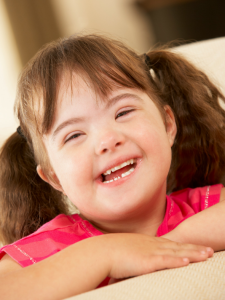
“Your baby will not be normal. He won’t have a very good quality of life…You may want to consider abortion.”
Unfortunately, this is an actual message that a friend of mine, Danielle*, heard from her doctor.
Danielle, a strong woman with a deep faith in Jesus, responded, “Don’t you ever mention that word to me again!”
But how many times does a doctor sway a woman, just finding out that her baby has special needs, to end her pregnancy? Are we “eliminating” disabilities like Down Syndrome? Or are we instead deciding that some lives aren’t worth living?
Perhaps you have read about the recent CBS report of Iceland “eliminating” Down Syndrome. Rather than developing a treatment, Iceland has “eliminated” many babies born with Down Syndrome via abortion. After prenatal screening tests indicate an anomaly, a high percentage of women in Iceland have chosen to end their pregnancies.
While this news can be shocking and deeply saddening, it is sadder still to realize that the “elimination” of babies with Down Syndrome goes far beyond Iceland. Many babies diagnosed prenatally with Down Syndrome in the United States and other countries are also aborted.
According to the best estimates available, abortion after prenatal diagnosis has reduced the population of individuals living with Down Syndrome in the U.S. by approximately 30%. A 2012 publication indicates a 67% abortion rate following prenatal diagnosis in the U.S.
A woman who receives test results that indicate Down Syndrome or another anomaly is in a very difficult position. She may wonder why God is giving her a “broken” baby. Her physician may start to talk about a “choice” she needs to make soon.
After this diagnosis, a pregnant woman’s physician may give her outdated information about the high percentage of women who end pregnancies where Down Syndrome is indicated. He or she may suggest she make this choice essentially because “everyone else is doing it.” Or her doctor, like Danielle’s, may openly suggest abortion. Or he or she may even seek to persuade her to end her pregnancy — because of the “doomed” life her child will lead.
When a woman faces an unintended pregnancy, she often needs support and connections to resources. Similarly, when a woman or couple faces an unexpected diagnosis, a show of support and referrals to resources can make a world of difference.
How much would it alter the situation if a physician shared that people with Down Syndrome can live full, healthy lives? People with Down Syndrome attend school, work, participate in decisions that affect them, have meaningful relationships, vote and contribute to society in many wonderful ways. The life expectancy for people with Down Syndrome is 60 years of age.
What if a compassionate nurse offered to connect a woman or couple with other families who are raising children with Down Syndrome? Would a caring network of support make a difference? We believe, yes.
In our clinic, we rarely see women who are looking at an abortion decision due to a fetal anomaly, such as Down Syndrome. Most of our patients who are considering ending a pregnancy are doing so because of difficult life circumstances. They may not be able to afford a child. Or they may believe a child will interfere with school or work. Or perhaps they are having relational difficulties.
Nonetheless, at Care Net, we view every human life as valuable from conception through natural death. Each person, no matter how “useful,” is created in the image of God. Every human being is intrinsically valuable – because he or she is a human being.
A country aiming to “eliminate” Down Syndrome in this way declares that some lives are more expendable than others.
This disturbing idea calls to mind a famous poem written by Martin Niemöller, a friend of Dietrich Bonhoeffer:
“First they came for the Socialists, and I did not speak out—
Because I was not a Socialist.
“Then they came for the Trade Unionists, and I did not speak out—
Because I was not a Trade Unionist.
“Then they came for the Jews, and I did not speak out—
Because I was not a Jew.
“Then they came for me—and there was no one left to speak for me.”
Now, “they” are coming for the babies diagnosed with Down Syndrome – or another fetal anomaly. Will the Church stand in the gap in their defense? I hope, yes.
It is always right to defend and protect the vulnerable. It is always right to offer help, hope and support to women, men and families in difficult circumstances.
Thank you for being a defender and protector. Thank you for offering help, hope and support to make life choices possible.
* Name changed to protect privacy.